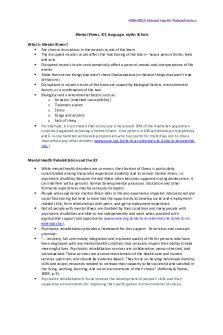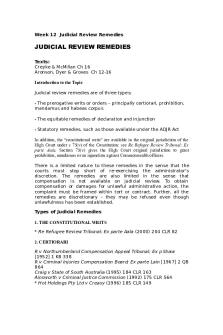HSBH3015 Lecture Notes PDF

| Title | HSBH3015 Lecture Notes |
|---|---|
| Author | lily do |
| Course | Mental Health Rehabilitation (online) |
| Institution | University of Sydney |
| Pages | 5 |
| File Size | 130.4 KB |
| File Type | |
| Total Downloads | 26 |
| Total Views | 130 |
Summary
Download HSBH3015 Lecture Notes PDF
Description
HSBH3015 Mental Health Rehabilitation Mental Illness, ICF, language, myths & facts What is Mental Illness? Are chronic disruptions in the neural circuits of the brain The disrupted neural circuits affect the functioning of the brain – how a person thinks, feels and acts Disrupted neural circuits can dramatically affect a person’s moods and interpretations of life events Make them sense things that aren’t there (hallucinations) or believe things that aren’t true (delusions) Disruptions in neural circuits of the brain are caused by biological factors, environmental factors, or a combination of the two Biological and environmental factors such as: o Genetics (inherited susceptibility) o Traumatic events o Stress o Drugs and alcohol o Lack of sleep For example, it is estimated that at any one time around 20% of the Australian population could be diagnosed as having a mental illness. One person in 100 will develop schizophrenia and 6 in one hundred will develop depression which accounts for more days lost to illness than almost any other disorder (www.sane.org (Links to an external site.)Links to an external site.).
Mental Health Rehabilitation and the ICF
While mental health disorders are common, their burden of illness is particularly concentrated among those who experience disability due to serious mental illness, i.e. psychiatric disability. Because mental illness often becomes apparent during adolescence, it can interfere with a person’s normal developmental processes. Education and other formative experiences may be seriously disrupted. People who experience mental illness later in life also experience impaired interpersonal and social functioning but tend to have had the opportunity to develop social and employmentrelated skills, form relationships with peers, and gain employment experience. Not all people with mental illness are disabled by their condition and many people with psychiatric disabilities are able to live independently and work when provided with appropriate support and opportunity (www.sane.org (Links to an external site.)Links to an external site.). Psychiatric rehabilitation provides a framework for this support. Its services and concepts promote: “… recovery, full community integration and improved quality of life for persons who have been diagnosed with any mental health condition that seriously impairs their ability to lead meaningful lives. Psychiatric rehabilitation services are collaborative, person directed, and individualized. These services are an essential element of the health care and human services spectrum, and should be evidence-based. They focus on helping individuals develop skills and access resources needed to increase their capacity to be successful and satisfied in the living, working, learning, and social environments of their choice” (Anthony & Farkas, 2009, p. 9). Psychiatric rehabilitation’s focus stresses the development of people's skills and their supportive environments for improving their participation in environments of choice.
HSBH3015 Mental Health Rehabilitation
It is consistent with the World Health Organisation’s International Classification of Functioning (ICF, http://www.who.int/classifications/icf/training/icfbeginnersguide.pdf (Links to an external site.)Links to an external site.) and a biopsychosocial model of health.
The importance of language
What we call people often reflects our beliefs about them. Labelling people by their condition, e.g. a “schizophrenic”, suggests that the condition is their most important feature. If there is need to include the condition – and do spend some time thinking about why people with mental health conditions are not just ‘people’- a more sensitive way is to acknowledge the person first, e.g. a person with mental illness, a person with schizophrenia. The use of person-first language is essential for combating the negative effects of stigma. 'Clients' and 'consumers' are also terms that have been used to refer to a person with mental ill-health. Whatever the term used, it should be respectful and reflect the value of the individual. In a similar vein, the term severe and persistent mental illness is preferred to the use of ‘chronically mentally ill’ because chronic has become equated with low functioning and hopelessness, an inaccurate and often harmful label. Even better still is that someone 'has been working towards recovery for a long time'. In regards to the term psychiatric disability, "the terms psychosocial and psychiatric disability are often used interchangeably. Psychosocial disability is now the preferred term and it is used by the United Nations Convention on the Rights of People with Disabilities as it acknowledges the often devastating impacts on – for example – housing, employment and relationships that people affected by mental illness/distress can experience" (Mental Health Coordinating Council, 2013) Much of what has been written about disability arising from mental illness has, of necessity, focused on characteristics of the illnesses themselves. It is important to bear in mind that people with mental health conditions are not a homogeneous group, and, as in all other areas of rehabilitation service delivery, the specific needs of each individual must be paramount when planning rehabilitation programs. Take a few moments now to read the recommended language guidelines for people with psychosocial disabilities. Apart from providing you with general guidelines for everyday use, this article will provide you with some helpful hints for your use of language in the online discussions and in your essay! Here is the link: http://mob.mhcc.org.au/media/6861/valued-status-recovery-orientedlanguage-guide-2012-12-14.pdf (Links to an external site.)Links to an external site.
Myths and Facts Despite ample evidence to the contrary, myths of mental illness continue. While you may have previously been exposed to some of the myths of mental illness, before we launch into the rest of the semester's material it would be of value to access the latest information about myths from this link: http://www.health.gov.au/internet/publications/publishing.nsf/Content/mental-pubsw-whatmen-toc~mental-pubs-w-whatmen-myth (Links to an external site.)Links to an external site.. For those of you who would like to read an article that clearly presents the scientific evidence correcting myths about schizophrenia (and please note how old the article is and how long the evidence has been available to the public!), the article is available via the library search engine:
HSBH3015 Mental Health Rehabilitation Harding, C.M., & Zahniser, J.H. (1994). Empirical correction of seven myths about schizophrenia with implications for treatment. Acta PsychiatricaScandinavica, 90 (suppl 384), 140-146.
Week 2: Stigma & Oppression Stigma & Oppression There is only one reading for this topic, and it can be sourced from the following e-book: Mental health and social problems [electronic resource]: a social work perspective (Links to an external site.)Links to an external site. / edited by Nina Rovinelli Heller and Alex Gitterman. London ; New York : Routledge, 2011.
HSBH3015 Mental Health Rehabilitation Week 3: Recovery in Mental Illness
Recovery from mental illness Read: Factsheet recovery (PDF) Have you considered the concept of recovery for people with mental illness? What do you think recovery for people with mental illness means? Essentially it is being able to live a meaningful life despite the illness, like Elyn. It means
"living life to its fullest, having relationships being part of a community, holding down a job, going to school.
Recovery means living a satisfying, hopeful and contributing life, with or without the limitations of a psychiatric disability." (BU, 2011). If you'd like more examples about recovery for persistent conditions, as well as how recovery is possible and what it's like for someone to recover from serious mental illness, then read the one page fact sheet. The research and what it means for recovery oriented services In the youtube, Rob mentioned three influences on the recovery movement: (1) research that identified that people with severe mental illness do recover, (2) life stories of people that recover such as Elyn Sachs, and (3) the development of recovery oriented services. Now that you have listened to Elyn's and/or Andrew's story, and you have a better idea of what recovery for people with serious mental illness means, it is important that you also have a better understanding on the other two influences that Rob mentioned: the research underpinning recovery, and recovery-oriented service delivery. You can get this information from one excellent reading by Marianne Farkas, a world leader in psychiatric rehabilitation and recovery: Read: The vision for recovery today: what it is and what it means for services (Links to an external site.)Links to an external site. Marianne Farkas World Psychiatry. 2007 June; 6(2): 68–7 You will note that there is the possibility to get a PDF of this reading by accessing the link at the top right hand of the page, Week 4: Psychosocial/Psychiatric Rehabilitation What is psychosocial/psychiatric rehabilitation? What are its goals? Video: UMDNJ – Psychiatric Rehabilitation
HSBH3015 Mental Health Rehabilitation (1) First goal = recovery: -
Recovery means that the person can envision what their life looks like with a psychiatric illness but still being successful and satisfied in any way they choose
-
Attitude about life
(2) second goal = quality of life: -
It’s about adequate resources, family and friend, being important valued member of the community
(3) third goal = community integration -
Helping people, have socially valued roles rather than being living in these sort of very restricted segregated settings
-
Get to know people’s strength and help them find places in the community where they feel really comfortable and contribute
-
Manage their lives where they feel proud about themselves
Goals, values and principles of psychosocial/psychiatric rehabilitation
Psychosocial rehabilitation, or psychiatric rehabilitation as it is also known, covers the rehabilitation of persons with mental ill-health. It seeks to help people ‘determine the living, learning, working, and social roles they wish to achieve’ (Anthony & Farkas, 2009).
Psychiatric rehabilitation is concerned with the individual in the context of their environment. How that person functions is the result of the interaction between the person's capacities and the environment in which s/he lives and operates. This has always been clearly recognised in relation to physical disabilities.
Pratt and colleagues explain the goals, values, and guiding principles of psychiatric rehabilitation in chapter 4 of their ebook. This is an important reading in that it gives an excellent conceptual overview of psychiatric rehabilitation.
eBook: Pratt, Carlos W. Psychiatric Rehabilitation (Links to an external site.)Links to an external site....
Similar Free PDFs

HSBH3015 Lecture Notes
- 5 Pages

Lecture notes, lecture 3
- 5 Pages

Lecture notes, lecture Subspaces
- 21 Pages

Lecture notes, lecture 14
- 3 Pages

Lecture notes, lecture 6
- 3 Pages

Lecture notes, lecture 7b
- 4 Pages

Lecture notes, lecture 13
- 12 Pages

Lecture notes, lecture 12
- 9 Pages

Lecture notes, lecture all
- 62 Pages

Lecture notes- Lecture 1
- 20 Pages

Lecture notes, lecture Logarithms
- 13 Pages
Popular Institutions
- Tinajero National High School - Annex
- Politeknik Caltex Riau
- Yokohama City University
- SGT University
- University of Al-Qadisiyah
- Divine Word College of Vigan
- Techniek College Rotterdam
- Universidade de Santiago
- Universiti Teknologi MARA Cawangan Johor Kampus Pasir Gudang
- Poltekkes Kemenkes Yogyakarta
- Baguio City National High School
- Colegio san marcos
- preparatoria uno
- Centro de Bachillerato Tecnológico Industrial y de Servicios No. 107
- Dalian Maritime University
- Quang Trung Secondary School
- Colegio Tecnológico en Informática
- Corporación Regional de Educación Superior
- Grupo CEDVA
- Dar Al Uloom University
- Centro de Estudios Preuniversitarios de la Universidad Nacional de Ingeniería
- 上智大学
- Aakash International School, Nuna Majara
- San Felipe Neri Catholic School
- Kang Chiao International School - New Taipei City
- Misamis Occidental National High School
- Institución Educativa Escuela Normal Juan Ladrilleros
- Kolehiyo ng Pantukan
- Batanes State College
- Instituto Continental
- Sekolah Menengah Kejuruan Kesehatan Kaltara (Tarakan)
- Colegio de La Inmaculada Concepcion - Cebu




